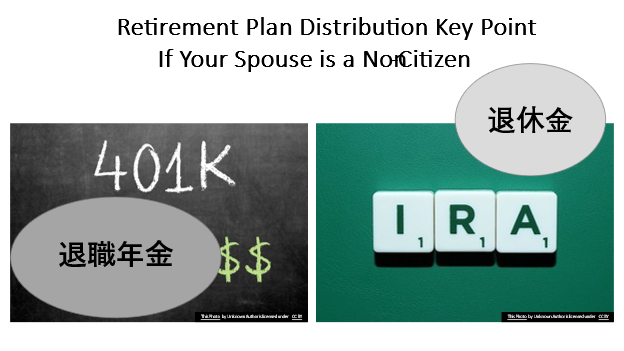Supports Cross Border Professionals and Families

After the death of a participant, a retirement plan or IRA will be distributed to the participant’s beneficiary or beneficiaries. The beneficiary(es) take distributions as a beneficiary of an “inherited plan/IRA.” The death of the participant triggers required distributions and a new calculation of mandatory retirement distribution (“MRD”).
There are several possibilities for post-death payout. In general, if you name your spouse as the sole beneficiary, the spouse may use a more generous calculation compared to the case where you designate the trust or estate as the beneficiary or name multiple individuals as beneficiaries. You want your spouse to have more flexible use of your retirement plan. The spouse also may elect to treat the account as the spouse’s account or roll over the account into the spouse’s existing account.
Tax treaty considerations;
If your spouse is thinking of returning to his/her own country after your death, you and your spouse must consider the consequence of the taxation of your plan distribution in his/her home country. By abandoning a green card, your non-citizen spouse will not need to file U.S. tax returns. Actual taxation differ based on the treaty with the U.S.
Suppose your spouse becomes a resident of Japan under the treaty. In that case, he/she will have no U.S. tax withholding of the retirement distribution, and only the Japanese government will tax the entire distribution.
Suppose your spouse decides to live in Taiwan; since the U.S. does not have a tax treaty with Taiwan, the distribution is subject to 30% withholding at the U.S. level. Taiwan uses the credit method to avoid double taxation of income. Therefore, your spouse must seek to maximize the foreign tax credit in his/her Tawain tax returns.
Thanks to the China-US tax treaty, I believe the treatment is the same as in Japan for your spouse if he/she decides to return to China. There may be different treatments for the U.S. social security distributions. (U.S. social security treatment is beyond the scope of this article.)
Roth Distributions:
Roth accounts enjoy tax-free distributions in the U.S. if the participants meet requirements. However, your returning spouse may not receive identical tax-free distributions in his/their home country simply because the Roth is a product of the U.S. retirement system. Other governments may want to tax the investment profit portion when received by the resident. If that is the case, your spouse should withdraw from Roth accounts if the requirements are met at that point.
Receiving Distributions:
You should note that most U.S. financial institutions would not wire the distributions to an account held in a foreign country. However, they may send a personal check to a foreign country. They will wire the distribution to a U.S. financial institution as an ACH. You and your spouse also should be aware of your financial institution’s policy about the way they can distribute.
As you can see, there are two or triple steps of consideration and planning to be done before any cross-border transactions should happen. I recommend you put enough review when designing a beneficiary of your retirement plan.
CDH provides tax return preparation and tax consulting services for cross-border individuals living in the United States or foreign countries and strives every day to solve and explain various problems and questions of these people. In addition, the issues these people face are complex and wide-ranging, including the tax laws of your country and the United States, immigration law, life insurance, and retirement rules. This article makes complex tax laws and regulations easy to understand, which is just the point. Therefore, there are many exceptions. There is also a risk that the rules have already changed by reading them. Please contact us from the following website for the latest practices. Also, consult with tax and legal affairs experts if you take action.
CDH Resources: www.cdhcpa.com. If you can read Japanese, visit https://www.cdhcpa.com/ja/cross-border-individual-tax/. You can access them all on the page. YouTube, FaceBook, free online consultations, estate, permanent resident waiver, exit tax, Form 1040, tax simulation, overseas asset reporting, other sectoral online question forms, and monthly newsletter sign-ups. For more information-packed past articles, check out https://www.cdhcpa.com/ja/news/. Please feel free to use it. You can email me at [email protected]
